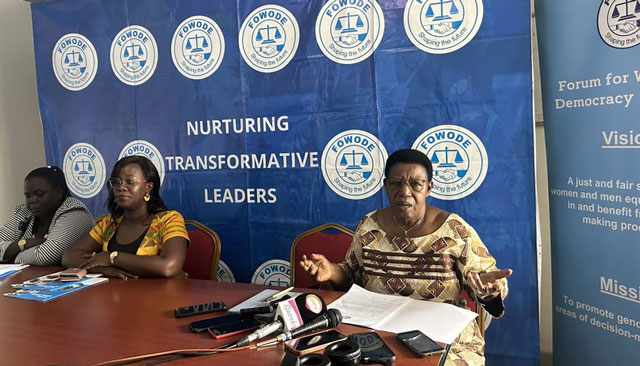
Kampala, Uganda | THE INDEPENDENT | Women activists have expressed concern over the escalating incidents of Gender-Based Violence (GBV) and child marriages, despite sustained efforts by various civil society organizations to combat the challenges.
Addressing journalists at the Forum for Women in Democracy (FOWODE) headquarters in Ntinda, Miria Matembe, a former minister and prominent women activist noted the disheartening trend of gender-based violence, which she said is undermining the hard-fought efforts initiated by pioneers like the late Joyce Mpanga.
Amid Uganda’s participation in the global 16 Days of Activism against Gender-Based Violence, Matembe voiced distress at the distressing content on social media depicting violent assaults on women by men. She highlighted the resurgence of the harmful practice of marrying off young girls, particularly in districts like Ssembabule, Lyantonde, and Kiruhura, often in exchange for cattle—a practice she had previously fought against
Matembe also raised concern about corruption, noting that women are often coerced into sexual exchanges for jobs or favors due to their limited resources, hampering their ability to contribute to national and family development. She pointed out that despite increased female representation in decision-making positions, the situation seems to be regressing, with worsening conditions related to gender-based violence.
Elizabeth Ampairwe, FOWODE’s Director of Programs, underscored the pervasive nature of GBV in Uganda, significantly impacting women and girls. She highlighted statistics from the police report of 2022, reveal alarming figures: 17,698 cases of domestic violence, 1,623 cases of rape, 8,960 cases of defilement, and 14,693 sex-related cases.
Ampairwe expressed concern about the dishearteningly low prosecution rates, indicating limited access to justice for GBV survivors. In 2022, only 7.8 percent of domestic violence cases reached court, and merely 1.1 percent resulted in conviction.
She urged the government, specifically the Ministry of Gender Labor and Social Development, to prioritize recruiting staff within the community-based services department in local governments. This, she argued, would significantly contribute to citizen mobilization and aid in combating negative cultural practices and societal attitudes.
Additionally, Ampairwe called for bolstering the capacity of key institutions dedicated to GBV prevention, such as the Child and Family Protection Unit of the police and the Office of the Director of Public Prosecution. Strengthening these institutions, she believes, is crucial in effectively addressing and mitigating gender-based violence cases in Uganda.
****
URN
 The Independent Uganda: You get the Truth we Pay the Price
The Independent Uganda: You get the Truth we Pay the Price





